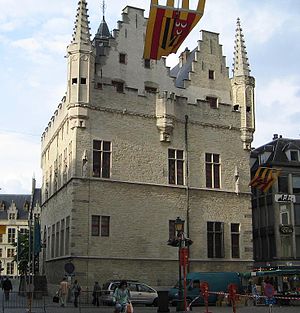Great Council of Mechelen
| Great Council | |
|---|---|
| Grote Raad / Grand Conseil / Grosse Rat | |

The Schepenhuis in Mechelen, seat of the Great Council 1473–1477 and 1504–1609
|
|
| Established | 1473 |
| Dissolved | 1794 |
| Country | Seventeen Provinces |
| Location | Mechelen |
| President | |
From the 15th century onwards, the Great Council of the Netherlands at Mechelen (Dutch: De Grote Raad der Nederlanden te Mechelen; French: le grand conseil des Pays-Bas à Malines; German: der Grosse Rat der Niederlände zu Mecheln) was the highest court in the Burgundian Netherlands. It was responsible for the Dutch-, French- and German-speaking areas. In Luxembourgish the phrase "mir ginn op Mechelen" (we'll go to Mechelen) still means playing one's last trump card. The Grote Raad first sat in the Schepenhuis in Mechelen then, from 1616, in the (old) palace of Margaretha of Austria on Keizerstraat.
The medieval rulers were assisted by advisers. Together with the ruler they formed the Council of State, also called the consilium or curia. Gradually the council became more specialised, with separate financial, judicial and political council emerging.
In the Burgundian Netherlands, the councils initially travelled with the Duke. In 1473 Duke Charles the Bold decided to establish the council in a specific location, in Mechelen. The council took on the name of the Parliament of Mechelen. After Charles' death in 1477, this parliament was abolished again by Charles' daughter Mary of Burgundy on the occasion of the issuing of the Great Privilege. This was the result of the constant struggle between the centralisation of the rulers and the particularism of the states. The French king was also against a parliament in Mechelen, as it would become a rival of the Parliament of Paris. Nonetheless, under Philip the Fair, the Great Council was again established in Mechelen in 1504, this time permanently, but without the addition of parliament to its name.
In the 16th century the territorial powers of the Great council grew. Through the establishment of authority by Charles V, Holy Roman Emperor over Tournai, Utrecht, Friesland, Overijssel and Guelders, the council's territory now included all of the Seventeen Provinces.
...
Wikipedia
